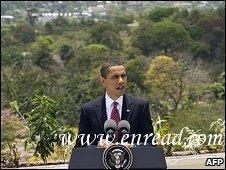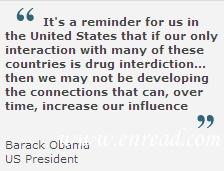| ||||||||||||||||||||||||||||||||||||||||||||||||||||||||||||||||||||||||
|
The Summit of the Americas has ended on an upbeat note, despite a lack of agreement on a joint1 declaration. 美洲峰会日前已结束,尽管在某些共同问题上没有达成共识。 Mr Obama said the US was interested in moving forward from past problems Regional heads of state had talks over three days, but several remained in dispute with(和……争论) the US on issues including Cuba's exclusion2(排除,除外) from the summit. US President Barack Obama said he saw positive signs from Cuba and Venezuela(委内瑞拉), and that the summit marked a new start in US relations with its neighbours. The leaders of Brazil and Venezuela also said they hoped for better ties. Brazilian President Luis Inacio Lula da Silva agreed he saw "potential positive signs" between the US and Cuba and Venezuela. Communist Cuba has been subject to a US embargo3(封港令,禁运) since 1960, while Venezuelan President Hugo Chavez was an implacable(难和解的,敌人) foe4(敌人,仇敌) of former US President George W Bush. Key issues Mr Chavez also hinted at a thawing5(融化,溶化) in relations. "We have a different focus obviously, but we are willing, we have the political will to work together," Reuters news agency reported him as saying. Mr Obama headed to the Summit of the Americas in Trinidad having offered Cuba a "new beginning" in relations with the US. Many others in the region wanted better, more constructive6 ties with US, he said. In a news conference at the close of the summit, Mr Obama conceded(承认,让步) that decades of US policy on Cuba "hasn't worked the way we wanted it to". But he highlighted(突出) a string(线,一串) of key issues where Cuba must make progress. "Issues of political prisoners, freedom of speech and democracy are important, and can't simply be brushed aside," Mr Obama said. Hope and belief Despite the upbeat(乐观的) statements, the Summit of the Americas was left without a final declaration as the 34 countries taking part failed to reach a consensus(一致,合意). Left-wing leaders from Bolivia(玻利维亚), Honduras(洪都拉斯) and Nicaragua(尼加拉瓜), as well as Venezuela's president felt the document omitted crucial issues such as the US embargo on Cuba. But criticisms of the US were generally softened7 by admissions of respect for Mr Obama himself. Nicaragua's President Daniel Ortega emerged as a strong critic of US economic policy, and told the US president his views during a meeting between Mr Obama and Central American leaders. But Mr Ortega praised Mr Obama's approach to dialogue: "I want to believe he's inclined(倾向于), that he's got the will," he said. Mr Obama signed off noting that he had heard his Latin American counterparts praise the good work done by Cuban-trained doctors working across the continent. "It's a reminder8 for us in the United States that if our only interaction with many of these countries is drug interdiction9(封锁,禁止), if our only interaction is military, then we may not be developing the connections that can, over time, increase our influence," he said. 点击  收听单词发音 收听单词发音
|
||||||||||||||||||||||||||||||||||||||||||||||||||||||||||||||||||||||||
- 发表评论
-
- 最新评论 进入详细评论页>>





